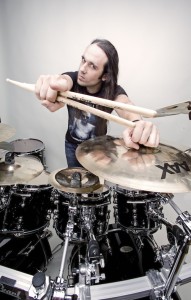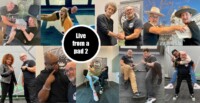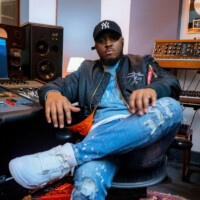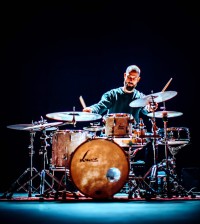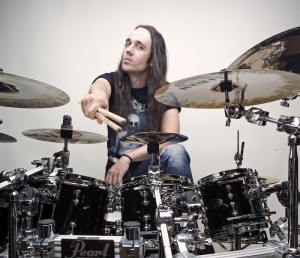 George Kollias belongs to a different breed of drummers. His hand and foot speeds are just as incredible as they are mind-blowing, and add a viciousness to his blast beats which is absolutely unique. Over the years this made Kollias to one of the most in-demand drummers on the international metal scene and got him the chair for bands like Nightfall, Sickening Horror, Contrarian and many more.
George Kollias belongs to a different breed of drummers. His hand and foot speeds are just as incredible as they are mind-blowing, and add a viciousness to his blast beats which is absolutely unique. Over the years this made Kollias to one of the most in-demand drummers on the international metal scene and got him the chair for bands like Nightfall, Sickening Horror, Contrarian and many more.
Today George is mainly the power house behind Technical Death Metal (TDM) band Nile, where he keeps pushing the boundaries of Extreme Metal drumming on a daily basis. However, there is much more to the Greek than just kick drum speed racing.
I caught up with George at the UK Drum Show to talk about his way into extreme drumming, his love for education and his one big passion off the drum chair.
You started your musical journey on guitar.
Yes, that’s because my brother started playing the guitar so there was a guitar around the house, and of course I had to get into it. I wanted to start the drums but they were a little bit expensive for someone so young. I didn’t come from a musical family so nobody really ‘got it’, you know? I spent a couple of years on guitar, and then managed to get my first kit.
Where did it go from there? Did you have lessons?
Yes I went to a music school in my home town which is about an hour away from Athens. There was no actual drum teacher so I had my drum lessons with a really famous guitar player. He had to do the dirty job and I managed to learn how to read music and all that basic stuff. Even though I was really young and had my mind set on thrash – I wasn’t interested in bossa nova and swing – I managed to get the basic education and later on started getting private lessons from Yannis Stavropoulos, one of the best drummers in Greece. That’s when my mind was opened to other styles.
You sometimes change to traditional grip. Is there a jazz background somewhere in there?
No, but sometimes I do use traditional grip, yes. I love that grip and I use it a lot but not on a really high level. My background was 100% metal. As a young kid it was metal only, stupidly focused. I think my second teacher opened my mind to other sides of music. I’m not a jazz drummer, but I think I can swing to a level and make it sound good at least. It took me eight years or so to open my mind, but that’s not necessarily a bad thing because all these years that I was digging into thrash metal and death metal, I made a lot of progress in the music I’m playing now. Later I started absorbing different things and made it a little better. That’s how it works.
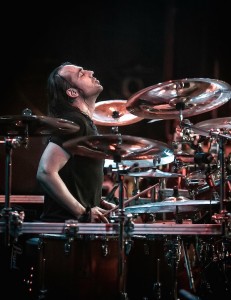 So metal has just always been a passion? Greece does have a huge metal scene, doesn’t it?
So metal has just always been a passion? Greece does have a huge metal scene, doesn’t it?
Yes, it does. Not in my hometown though, so I actually don’t know why I started playing drums and how I became a metalhead in this town. Seriously. I was one drummer and in my school I was the only metal guy, always.
It was just my thing. I spend a lot of time on it, pretty much dedicated my life to it and now I see the benefits. I’m here to play the main stage at the UK Drum Show, so I consider myself very lucky.
‘Best Extreme Metal Drummer 2016’ speaks for itself. Was it a conscious decision to go into the extreme side of things?
Yes it is. About five years ago pretty much all of the well known drummers quit. It takes a lot to get there and it takes even more to stay there. It’s a constant race and you’re going through pain pretty much every day but I just like to push things, I don’t like the more secure ways. I like to raise the bar for me – not for the band, not for the fans, not for anybody – it’s for me only. That’s what I do pretty much with everything I get involved in. I’m very competitive but in a healthy way.
You’re still young, but do you notice the extreme thing getting harder the older you’re getting?
Oh, that’s a good question. I turned 40 last summer but I don’t feel 40 for sure. Drum-wise I’m in much better shape than when I was 25 for sure. I can’t really explain it but I think it might have to do with the miles you put on an instrument. Either way, I feel way better – and now I’m about to quit smoking so it will turn even a little bit better – I hope!
You pretty much came up with your own double kick technique with the swiveling motion and I know you spent a lot of time on it, having your movements observed by various doctors.
Yes, but swivel is not really a technique, it’s more a way to play heal up. For me it’s just a different method, but the motion is still heal up – so for me swivel is not a big deal. Everything I do in this genre today fortunately nobody did in the past: pushing the tempos for example. We’re pushing up to 280/290bpm blast beats. I know many bands do that but we use one foot, so it’s a whole different world. No two-foot-blast where the 8th notes get split up instead of playing them with one foot. People ask me how fast it can go. I don’t know. We live in the moment, it’s happening right now.
I don’t know about injuries either. Maybe in five years I’m not gonna be able to walk anymore. You never know this stuff.
I think we live in the moment of the evolution of the instrument and that’s why at least in my clinics I push everybody to do the traditional blast beat with one foot and help us grow. Maybe somebody will take it further. Some people prefer to go with the easier way: for double bass we have the doubles nowadays which is a bit of a new fashion. I don’t mind that, whatever feels great for you, but it doesn’t really help the evolution to see where we can get it.
Other metal drummers achieve volume by triggering or simply putting the fader up but your technique seems very powerful in itself.
[Laughs] We call it the tapping. I always try to get away from that but it’s really hard. If you play 16th notes at 260/270bpm and try to keep up with it, it’s really difficult to keep the big motion. My background is thrash drumming so I learnt how to hit properly at a young age. I didn’t use finger technique or something like that, it was all wrist motion. I think that’s where I get a little bit more power. I always try to play loud because it’s an instrument that’s supposed to be played loud – and it’s metal.
If you ask me if I like triggers – no, I don’t. I think nobody actually likes triggering but the problem is that the bass drum is a big drum. There is a lot of air moving in there and it’s really hard to get rebound out of a 22” drum head. You hear whatever we play but the volume will be different if I don’t use triggers. That firstly means that I sometimes can’t clearly hear what I’m doing and secondly my band will not be able to lock their riffs in. So it’s a necessary thing and I personally don’t think it’s cheating because I still play the instrument. It’s not that you hit the bass drum and you get four hits out of it. I wish! [laughs]
So I still really sweat and I’m in pain but it’s all about sound in my opinion.
The Nile show is a 90 minute power workout for you. How do you get through that? Do you warm up a lot?
Not really. I try to to reduce the risk of injury (so I kind of have to) but I think warming up with a pad is really boring. Give me a small 4-piece drum kit and I can sit there for three hours and be fine, but with pads it’s always boring.
Nile is one of those bands that play a lot and it’s not just me pushing it. The guitar players and everybody push their limits, that’s why we love the band. Once on tour we had a two hour show. Once you get through the first 10-15 minutes, then I cant get up for three hours, but the first two/three songs are a challenge. Especially when for some reason you’re not in the mood, or tired, or sick.
You joined Nile in 2004. How did the gig come about?
One of their ex drummers and very good friend of mine, Derek Roddy, did a session for Nile for one album. Derek is definitely one of my mentors and somebody I was really looking up to. After that they had another drummer doing the touring and the next album but after he left they went back to Derek asking him if he could recommend anyone for the gig. At that time I had known Derek for about six months and had given him a promo tape of one of my bands [Sickening Horror] which was really fast and complicated music. He really liked it and started talking about me in the industry. He said I should do some videos and make people see me, so I recorded the whole next show, put it online and slowly started to get fans.
That was the video Nile saw and that got me the gig.
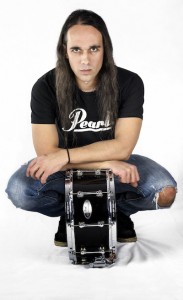 People might only think of you as a metal drummer, but you play all kinds of styles, right?
People might only think of you as a metal drummer, but you play all kinds of styles, right?
My goal is to be an all-round drummer, I don’t just want to be ‘that drummer’. To be honest, I play way more funk music, jazz and pop music than extreme metal. I only play extreme metal when I rehearse with my band and when we’re on tour. I don’t even really listen to it to be honest. It’s just too much. You go on tour with five bands; metal, metal, metal! You need to get away a little bit; it’s healthy to get away.
So I try to be an all-round drummer. I do a lot of sessions but only non-extreme-metal sessions. Yes, I work as a session drummer, but I’m very picky to have different stuff. It helps me a lot. Obviously I get paid as well, but I don’t want to do what I do with Nile with other bands. That would just take away from Nile.
Do you have your own studio in Athens?
It’s funny you mention this because I finished my new studio four days ago and I’m the happiest man in the world. Seriously, look at my face!
I’ve got my big drum kit there, I have way more space, cameras set up, mics set up – I can do everything there. My biggest dream was to be able to have my big kit and my small set up (20” kick, 2 toms, 2 floors, 4 cymbals) both in the same room. Now I can go back and fourth between the two drum sets. It’s right under my house and I spend about six to seven hours a day in there.
I also do remote recordings where people send me their songs and I send them a multi-track drum recording back. I don’t record any bands in there though. It’s just for my drum sessions, Nile stuff and my solo project.
You have brought out some instructional DVD’s and books over the years. Has the educational side always been a passion?
Yes. If we sit down at a drum set I can’t stop talking about drums. I really like to share, I love learning and I learn from everybody. I’m a drum freak and if you like drums so much, you usually like to share as well.
Education has been a big part of me: learning mainly but I’ve also been teaching since 2000. I just at two big drum schools: the Modern Music School in Germany and LAB Music Education in Greece. I don’t do private lessons there because I don’t have enough time due to all the touring but I teach on their professional programs.
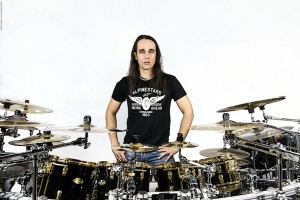 My first book came out about two years ago, my second one is coming out very soon. It’s about a year late because my daughter was born and that pushed everything back. We’re only missing the final photo shoot and a bit of layout but everything else is ready to go. That’s gonna be Part 2 of “The Odyssey of Double Bass Drumming”. There will also be a Part 3 which obviously is more extreme.
My first book came out about two years ago, my second one is coming out very soon. It’s about a year late because my daughter was born and that pushed everything back. We’re only missing the final photo shoot and a bit of layout but everything else is ready to go. That’s gonna be Part 2 of “The Odyssey of Double Bass Drumming”. There will also be a Part 3 which obviously is more extreme.
Regarding the DVD’s: my first one came out in 2008, the second one in 2012. They both have the same title because they’re very alike, covering topics from extreme drumming and general drumming. Obviously they cover different things but from similar topics. Now I’m making plans for a third DVD but it’s not gonna be educational. It’s gonna be more like a documentary: this is what I like to do; this is what I like in general; this is me jamming. Just something for fun. Something you watch and think ‘this was fun watching’ rather than learning. I have ten hours from the first two DVDs out there, I think we covered pretty much the biggest part.
Clinics are a big thing for me as well ever since I did my first one in 2005. Since then I did clinics everywhere: Australia, Japan, Europe, US, South Africa. I try to go everywhere. I just love the education side of things.
You also work on your own solo project?
Yes. There is one album out already called ‘Invictus’ but it’s all just for fun. I do have a big international label that releases the albums but I’m not interested in getting a band out there. I just write a lot of music. I actually play all the instruments for it. I play the guitars, the bass, do all the vocals but got some guests in for most of the guitar solos because I suck at guitar solos. I will probably release the new solo album after the new Nile album.
Where do you find time for all of this?
Well, when I’m in the house music is just a daily thing. My riffs and songs are not up there to the Nile level, they are more simple and catchy. I get amazing feedback and people love it but it’s not up there to give it to Nile. I do play stuff to them and if they like any riffs we use it for the band but I mainly write songs and put them together because it’s fun. Playing all the instruments was a big challenge for me.
It’s still super fast metal but not very complicated – the riffs are more simple, the drumming is complicated. We’ll see about the new one. It always depends on how I feel. Maybe the new one has some grooving in there, maybe both drum sets. Like I said, it’s for my fun, there is no band and nobody tells me what to do. I do whatever the hell I want which is the best thing in the world – and I just share it with people. In fact, it’s available for free download on my website.
You’re the first drummer I’ve ever met who has an Alpinestars endorsement. So motorcycling is a big part of your life?
Yes, it was a big thing for me from a young age. I did a lot of off-road riding but when I joined Nile they told me I had to stop, so I didn’t ride for about eight years. After that I came back stronger though. Now I do a lot of track riding and train pretty much twice a week – SuperSport and SuperMoto nowadays. I’m in a riding school academy in Athens with one of the best educators and good friend of mine Thanasis Choundras. Like I said: push everything to the limit. I also took part in some races with good results.
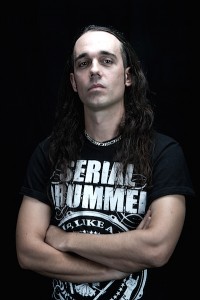 So do you have a good insurance on your body parts?
So do you have a good insurance on your body parts?
I know it’s a little bit extreme. [laughs] Unfortunately I can’t get an insurance on my hands or my knees but I think if you do something the right way – and of course with protection – it’s all ok. It’s not that I’m going by myself. I know how to ride a bike, I know how to race. I actually even got offers to become an instructor but I don’t think I would have enough time. I love the guys though, we have a lot of fun and it really relaxes me.
All the riding lessons and racing really changed me and gave me so much joy. But it also kind of made me drop the motorcycling in the city. That’s extreme. I’m scared of that more every day. I haven’t ridden at all in five months now though so I’m getting a little itchy.
Finally, what’s next?
Many things. Like I said, I’m making some plans for a DVD. I don’t know where I’m gonna release it yet – maybe Hudson music again – but I want it to be something special, something fun.
We’re also working on the new Nile album. Especially now with my new studio in my house I really want to raise the bar with it. Over the next six or seven months I will do my best and play the best I can.
And between all of this I’m working on the new solo album.
Thanks a lot for your time George!
Interview by Tobias Miorin
March 2017

